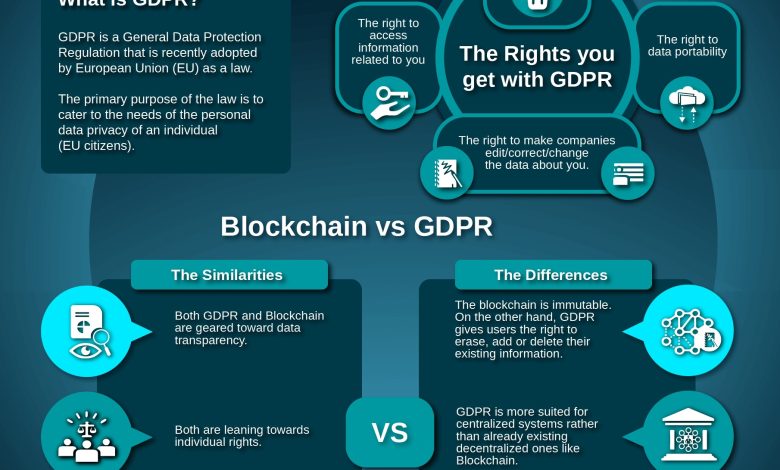Blockchain and Data Privacy

- Understanding the Basics of Blockchain Technology
- The Role of Blockchain in Ensuring Data Privacy
- Challenges and Opportunities of Implementing Blockchain for Data Privacy
- Exploring the Relationship Between Blockchain and GDPR Compliance
- How Blockchain Can Empower Individuals to Control Their Own Data
- Future Trends in Blockchain Technology and Data Privacy
Understanding the Basics of Blockchain Technology
Blockchain technology is a decentralized, distributed ledger system that securely records transactions across a network of computers. Each block in the chain contains a list of transactions, and once a block is added to the chain, it cannot be altered. This makes blockchain a secure and transparent way to store data.
One of the key features of blockchain technology is its ability to provide data privacy. By using cryptographic techniques, blockchain ensures that data stored on the network is secure and tamper-proof. This means that sensitive information, such as personal details or financial transactions, can be stored on the blockchain without the risk of unauthorized access.
Blockchain technology also allows for data to be shared securely between parties without the need for a central authority. This means that individuals can have more control over their own data and who has access to it. Additionally, blockchain can help prevent data breaches and cyber attacks by providing a secure way to store and transfer information.
Overall, understanding the basics of blockchain technology is essential for anyone concerned about data privacy. By utilizing blockchain technology, individuals and organizations can ensure that their data is secure, private, and tamper-proof. With its decentralized nature and cryptographic security measures, blockchain is revolutionizing the way data is stored and shared in the digital age.
The Role of Blockchain in Ensuring Data Privacy
Blockchain technology plays a crucial role in ensuring data privacy in today’s digital world. By its very nature, blockchain offers a secure and transparent way to store and transfer data without the need for a central authority. This decentralized approach to data management helps protect sensitive information from unauthorized access and tampering.
One of the key features of blockchain that enhances data privacy is its immutability. Once data is recorded on a blockchain, it cannot be altered or deleted without the consensus of the network participants. This makes it extremely difficult for malicious actors to manipulate data or compromise the integrity of the information stored on the blockchain.
Furthermore, blockchain uses cryptographic techniques to secure data, ensuring that only authorized parties can access and view sensitive information. This adds an extra layer of protection to data privacy, making it more challenging for hackers to breach the system and steal valuable data.
Overall, blockchain technology provides a robust solution for safeguarding data privacy in various industries, including finance, healthcare, and supply chain management. By leveraging the unique features of blockchain, organizations can enhance their data security measures and build trust with their customers and partners.
Challenges and Opportunities of Implementing Blockchain for Data Privacy
Implementing blockchain for data privacy presents both challenges and opportunities for organizations. One of the main challenges is the complexity of integrating blockchain technology into existing systems. This process requires significant resources and expertise to ensure a seamless transition.
Another challenge is the scalability of blockchain networks, as they can become slow and inefficient when handling a large volume of transactions. This can hinder the performance of data privacy measures implemented using blockchain technology.
On the other hand, implementing blockchain for data privacy also offers opportunities for organizations to enhance security and transparency. Blockchain’s decentralized nature makes it difficult for malicious actors to tamper with data, ensuring the integrity of sensitive information.
Furthermore, blockchain can provide a secure and immutable record of data transactions, allowing organizations to track and verify the authenticity of information. This can help improve trust among stakeholders and enhance data privacy compliance.
Exploring the Relationship Between Blockchain and GDPR Compliance
When it comes to exploring the relationship between blockchain technology and GDPR compliance, it is essential to understand how these two concepts intersect. Blockchain, known for its decentralized and immutable nature, has the potential to enhance data privacy and security. However, there are challenges in ensuring that blockchain systems comply with the General Data Protection Regulation (GDPR) guidelines.
One of the key considerations when it comes to blockchain and GDPR compliance is the issue of data transparency. While blockchain offers transparency through its distributed ledger system, GDPR mandates that individuals have the right to request the deletion of their personal data. This poses a challenge for blockchain systems, as once data is recorded on the blockchain, it cannot be easily altered or deleted.
Another aspect to consider is the concept of data minimization. GDPR requires that organizations only collect and store data that is necessary for a specific purpose. With blockchain, all data is stored on the ledger, which may not align with the principle of data minimization. Organizations utilizing blockchain technology must find ways to ensure that they are only storing essential data to comply with GDPR regulations.
Furthermore, the issue of data portability comes into play when discussing blockchain and GDPR compliance. GDPR gives individuals the right to transfer their personal data from one service provider to another. However, with blockchain’s decentralized nature, transferring data between different blockchain networks can be complex. Organizations must find solutions to enable data portability while maintaining the security and integrity of the data.
In conclusion, while blockchain technology has the potential to revolutionize data privacy and security, there are challenges that need to be addressed to ensure GDPR compliance. By understanding the intersection between blockchain and GDPR guidelines, organizations can work towards leveraging the benefits of blockchain technology while upholding data protection regulations.
How Blockchain Can Empower Individuals to Control Their Own Data
Blockchain technology has the potential to revolutionize how individuals control their own data. By leveraging the decentralized and secure nature of blockchain, individuals can have greater autonomy over their personal information. This means that instead of relying on centralized entities to store and manage data, individuals can store their data on a blockchain network where they have full control.
One of the key benefits of using blockchain for data control is the increased security it provides. Since blockchain is a distributed ledger that is encrypted and immutable, it is extremely difficult for hackers to tamper with or steal data stored on the network. This gives individuals peace of mind knowing that their sensitive information is safe and secure.
Furthermore, blockchain allows individuals to decide who has access to their data and under what conditions. Through the use of smart contracts, individuals can set specific permissions and rules for how their data can be accessed and used. This puts the power back in the hands of the individual, allowing them to determine how their data is shared and utilized.
Overall, blockchain empowers individuals to take ownership of their data and protect their privacy in an increasingly digital world. By utilizing blockchain technology, individuals can have greater control over their personal information and ensure that it is being handled in a secure and transparent manner.
Future Trends in Blockchain Technology and Data Privacy
As blockchain technology continues to evolve, there are several future trends that are expected to shape the landscape of data privacy. One of the key trends is the integration of zero-knowledge proofs, which allow for transactions to be verified without revealing any sensitive information. This will enhance privacy and security for users, making blockchain more appealing for a wider range of applications.
Another trend to watch out for is the rise of decentralized identity solutions. These solutions will enable users to have more control over their personal data, reducing the risk of data breaches and identity theft. By leveraging blockchain technology, individuals can securely manage their digital identities without relying on centralized authorities.
Furthermore, the implementation of homomorphic encryption in blockchain systems will enable computations to be performed on encrypted data without decrypting it first. This will provide an additional layer of privacy protection, ensuring that sensitive information remains secure throughout the data processing lifecycle.
Overall, the future of blockchain technology and data privacy is promising, with innovative solutions on the horizon to address the growing concerns around data security. By staying informed about these trends and advancements, businesses and individuals can better protect their data and leverage the full potential of blockchain technology.






